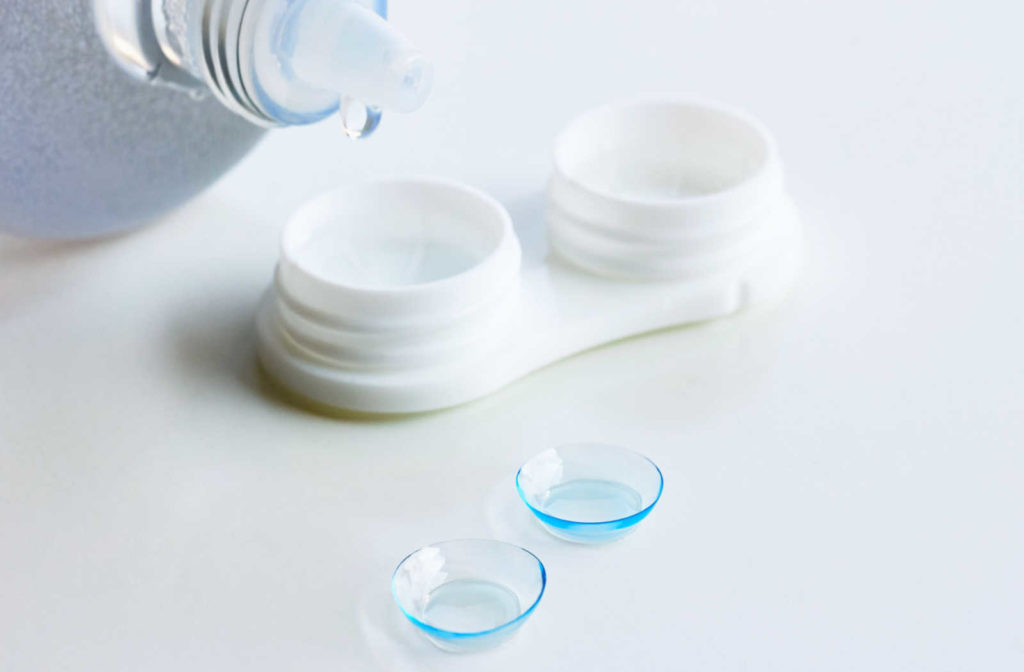Contact lenses are a common alternative to eyeglasses. They provide improved vision in people with refractive errors.
The lenses are typically thin and flexible plastic disks placed on the front part of the eye. When prescribed after a contact lens exam and used correctly, they can offer clear vision and replace the need for glasses.
But unlike glasses, contact lenses have expiration dates. Let’s look at the different types of contact lenses and how long they last.
Contact Lenses
Contact lenses are medical devices because they sit directly on the eye. They have several advantages over glasses:
- Offer clearer vision
- Move with the eye
- Clear peripheral vision
- No fogging up or getting wet
- Ideal for an active lifestyle
Soft contact lenses can include silicone hydrogel with a high moisture content that allows oxygen to reach the cornea. They are more popular than hard contact lenses because of the added comfort.
Contact Lens Types & Expiration
The lifespan of contact lenses depends on the type of lens you wear. If you want to avoid the hassle of cleaning and storing, you can go with disposable lenses. If you prefer longer-term wear, you can consider extended-wear contacts.
Soft Contact Lenses
Soft contact lenses are easy to adjust to and come in different types:
Soft Dailies
Daily contact lenses or dailies are disposable and thrown away at the end of the day. They are convenient and don’t require storage or cleaning.
Bi-weekly
Bi-weekly contacts are soft disposable lenses, replaced after 2 weeks or 14 days. These are for daily wear and should be removed at night, stored in contact lens solution, and disposed of after 2 weeks. You can alternate these with glasses, but remember to discard contacts after 14 days of use.
Monthlies
Monthly contact lenses or monthlies are also disposable after one month of use. These are worn during the day, removed at night, cleaned, and reused the next day.
Extended Wear
Extended-wear contact lenses have continuous wear. You can sleep with them and wear them during the day. With continuous wear, it’s best to clean them once a week to prevent infection and replace them monthly.
Hard Contact Lenses
Hard or rigid gas permeable contact lenses are harder than soft contacts but more durable. They produce clearer vision, are more resistant to build up, and last longer than disposable lenses, anywhere from one month to one year.
Hard lenses take more time to adjust and require more care and cleaning. With proper care, they can last longer but it is not recommended to wear them past their expiration date.
Wearing Contact Lenses Past Their Expiration Date
Replacing your lenses according to expiry dates or recommendations by your eye doctor can reduce your risk of eye infections and other complications. Here are some risks of wearing expired contact lenses:
- Inflammation
- Redness
- Eye pain
- Vision problems
- Sensitivity to light
- Eye infection
- Scarring
You should check the expiry dates of contact lenses before you buy them and before wearing them. Unopened contact lenses past the expiration date are not safe to wear. Lens packaging or individual lens containers usually have expiration dates printed on them.
Contact Lens Care
Contact lenses require more care and maintenance than eyeglasses. With proper care, you can ensure healthy eyes and lens hygiene:
- Wash and dry your hands thoroughly before handling contact lenses.
- Always replace the contact lens solution every time you clean your lenses. Never use tap water.
- Use contact lens solution indicated by the manufacturer or your eye doctor’s recommendation.
- Rub lenses to remove protein and bacteria buildup.
- Remove contact lenses at night.
- Use a contact lens case for storage and replace it frequently.
- Don’t wear contact lenses past their shelf life.
Contact lenses are generally comfortable. But if you experience discomfort, pain, or blurry vision, remove your contact lenses and contact your eye doctor immediately. Regular contact lens exams and fittings ensure you receive the most benefit from the right contact lens prescription and type for your eyes.
Healthy Eyes with Contact Lenses
You may find that your contact lenses are showing signs of wear even before the expiry date. These can include cloudiness, irritation, or damage.
If this happens, stop wearing them and contact Arena Eyeworks. We can recommend a replacement that better works for your needs, preferences, and lifestyle.



